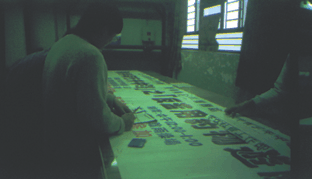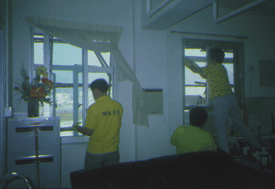Disabled but not idleNew projects run in sheltered workshopsBy Candice Ma In recent years, they have done more than simple packaging or assembling. The workshops under the Mental Health Association have extended their services to outdoor cleaning and banner production. There are five members on the banner production team in Kwun Tong. They have to work on two 5- by 15-foot tables. According to Mr. Wu Shing Choy, the manager of the Kwun Tong workshop, the main investment has been in computer hardware amounting to some $10,000.
“The workers first undergo Chinese character input training,” said Miss Alice Chan, the instructor of Kwun Tong workshop. The workshop can make more than 90 banners a month. “The workers do simple designs for the banners,” said Miss Chan. “I allow them to decide where to put some of the words on the banner.” This is “more creative” than simple packaging work, said Miss Chan. “I find it less boring to work on banners,” said Mr. Chan Kit Pui, a 42-year-old banner worker who have worked in the workshop for 5 years. “ I can earn more, too.” As reported by the Social Welfare Department in 1995, the average monthly wage for a sheltered worker is $350. A banner worker can earn four times more than a person packing pairs of gloves. “During peak times, a team member earns more than $2,500,” said Miss Chan. The job also helps the mentally-ill to become reintegrated into society. “Most importantly, instructors in the workshops can consistently observe the disabled person’s emotions so as to prevent any deterioration in their mental health,” said Mr. Wu. The job also teaches the mentally-ill to be responsible. “They have to meet deadlines,” said Miss Chan. “They are willing to take the banner stickers home for primary processing. They even work for extra hours on Saturdays.” On the other hand, the cleaning crews are also satisfied with their work. The cleaning team in Kwun Tong can earn more than $1,000 every month. The Lei Cheng Uk cleaning workshop has contracts with a library, a warehouse and a carpark office. They also do cleaning of residential flats after renovations and interior decoration. “We fax out leaflets and follow up with interested bodies,” said Mr. Mak Chi Ming, manager of the Lei Cheng Uk Workshop. Said Mr. Yau Cham Ping, an instructor of the Lei Cheng Uk Workshop: “I lead 14 to 15 workers each time. I have to keep reminding them every step. They are extremely forgetful.”
Photo by Candice Ma“The workers have to stand all day. In summer, they cannot switch on a fan or some will feel too cold,” said Miss Chan. Some are illiterate, making work on banners difficult. Assistance from the Social Welfare Department is deducted when the workers’ earnings reach the upper limit of full grant criteria. More discouraging, the public does not seem eager to provide jobs for the mentally ill. Clients for banner production are confined to voluntary groups, while those for car cleaning are limited to doctors and police staff. “They cannot work as fast as normal people,” said Miss Chan. On the other hand, Miss Donnie Lau, superintendent of the Bradbury Care and Attention Home for the Aged Blind, is satisfied with the performance of the Lei Cheng Uk team. “They are careful and do not omit procedures,” said Miss Lau. “They are polite, too.” Mr. Yeung Hok Man, owner of C. L. Production Company, employs the service solely on business grounds. “They are 10 percent cheaper than other companies. The quality of their production is up to standard.” [Fortune Telling||Quality vs. Quantity] |

